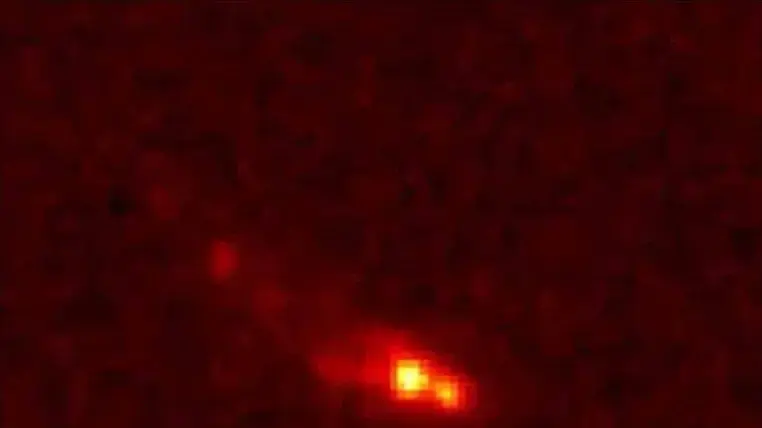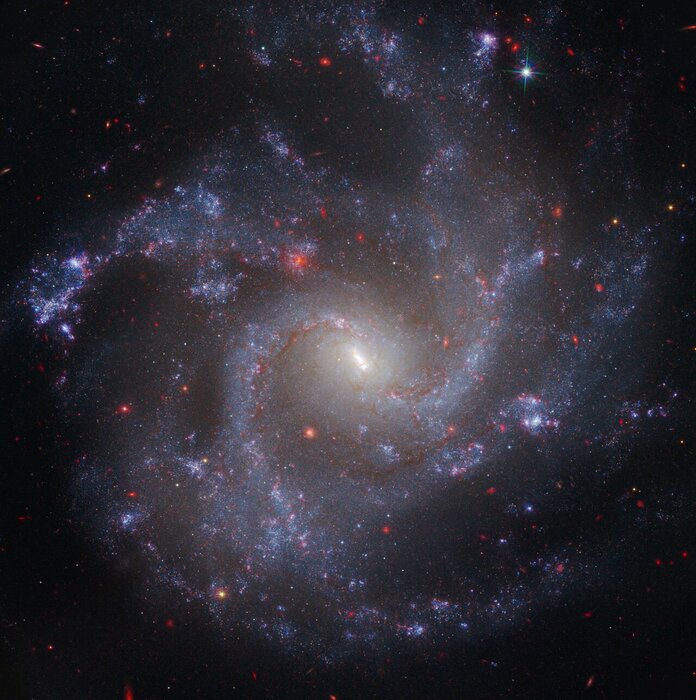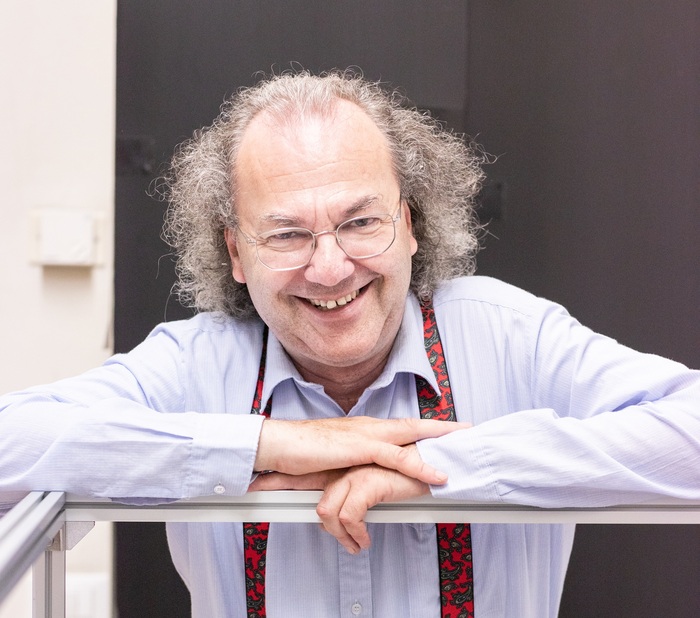Just days before the world was stunned and amazed by the first images from the James Webb Space Telescope (JWST), a group of three women shared a 40-minute video on YouTube titled
Behind the Name: The Telescope Space James Webb
.
This new documentary resurrects the controversy: part of the astronomical world calls for the name change of the most emblematic space telescope of our days for the role that James Webb, the man who gives the device its name, could have played in the purge of homosexual personnel within the POT.
In the documentary, astronomers Erika Nesvold and Lucianne Walkowicz and video producer Katrina Jackson tell the story of how NASA decided to name its most cutting-edge space telescope, why a group of astronomers belonging to the LGBTIQ+ community has been asking for change that name, and how NASA has stubbornly refused to take this request seriously.
On the night that President Joe Biden was to unveil the first telescope image with great anticipation, his delay of more than an hour had an unexpected result.
The wait meant that many voices from space sciences took the opportunity to demand the name change (and suggest new ones) and to spread the documentary on social networks.
James Webb's name, many discovered at the time, was in question.
James Webb was a NASA administrator between 1961 and 1968, when, in the midst of the Cold War, the United States sought to win the space race against the Soviet Union.
A career that culminated in the arrival on the Moon in the summer of 1969 of three astronauts with their brand new Stars and Stripes flag.
Horror Lilac
The problem is that, according to four members of the American astronomical community, Chanda Prescod-Weinstein, Sarah Tuttle, Brian Nord, and Lucianne Walkowicz herself, Webb was “partly responsible for setting in motion what was then federal policy: the purging of LGBT people from the workforce,” as they wrote in an open letter in
Scientific American
magazine .
This is the so-called Lila Terror (
Lavender Scare
, in English), a witch hunt against people suspected of being homosexuals with positions in the Administration, which Webb would have implemented when he was NASA administrator and in his previous political stage, as a number two from the State Department.
The activists launched a petition that was supported by 1,800 people in the scientific community, and NASA was forced to work "with historians to examine Webb's role in government" within months of launch.
However, on September 27, without having finished the investigations, the administrator of NASA, Bill Nelson, 79, sentenced: "We have not found any evidence at this time that justifies a name change."
Immediately afterwards, Walkowicz, promoter of the JustSpace Alliance (an organization dedicated to imagining a more inclusive and ethical future for space), decided to resign from NASA's astrophysics advisory committee.
As she explains in the new documentary, for her NASA's position "was like a slap in the face."
NASA defends that the name, which was chosen unilaterally by another NASA administrator, Sean O'Keefe, in 2002, honors the legacy of a key person for the US to succeed in the space race.
However, there is evidence that during his time at the State Department and NASA, several people were fired for their homosexuality.
The most famous case is that of Clifford Norton, who fought in court for years against his dismissal from NASA.
historical debate
As one of the researchers hired by NASA writes in one of the many internal emails that the journal
Nature
revealed in April, “That Webb had a central position during the Lilac Terror is beyond doubt.
The only thing left for historical debate is whether he believed in it or not."
However, "we will probably never find sentences written by Webb explaining his motivations."
According to historian Audra Wolfe, Webb played a key role in integrating science into foreign policy, as she explains in an email to EL PAÍS.
During his time at the State Department, he "was the representative on the committee that oversaw psychological warfare operations" against the Soviet Union.
In a book he wrote in 1969, after leaving the space agency, the former administrator explained that “the most important achievement of the Apollo project was not the scientific and technological success of reaching the Moon, but rather showing the world that democracies could reach to complete large-scale technical projects.
In that same book, Wolfe explains to this newspaper, it is Webb himself who gives arguments to the detractors of his name for the space telescope,
Although not very frequent, there are cases in which the US space agency changed the name of space missions.
The best-known case is that of the Swift space observatory, launched in 2004, which was renamed in 2018 as the Neil Gehrels Swift Observatory, in honor of its scientific manager.
In 2020, a few months before the launch of the Sentinel-6A/Jason ocean observation satellite, which added “Michael Freilich” to its name in honor of a geologist who had just retired from the space agency itself as head of the Science division from the earth.
In the documentary, more cases are remembered, such as that of the Chandra X-ray observatory, whose name was changed through a public contest a few months before its launch, in 1998.
NASA's communication office in a brief email to this newspaper ensures "no more information to share", that "the NASA historian and a hired historian have successfully completed their investigation of other historical archives previously closed by COVID-19 ″ and that “they are collecting the information that the agency will share.”
An opaque decision
"What annoys us the most as astronomers is that NASA has never explained very well how it made the decision," says Enrique López Rodríguez, an astronomer at the Kavli Institute for Particle Astrophysics and Cosmology at Stanford University, and one of the petition signers.
“They have not been transparent, nor sincere.
Scientists are used to making decisions with logic and arguments”, adds this canary, one of the future users of the telescope.
According to Erika Nesvold, "the internal conversations at NASA that we have read have not been kind."
“There has been a lot of disdain and rudeness towards promoters.
Even if they decide not to rename the telescope, they could have managed it much better and caused less harm to the community of LGBTIQ+ astronomers”, explains Nesvold.
And she adds: "They have not convinced us that Webb had nothing to do with homophobic politics, but they have perpetuated homophobia today."
As Sarah Tuttle points out in the documentary, “it seemed very simple and it should have been: there is plenty of information in the archives, and as a community we should have been able to identify our values and how to express them.
It seems to me that NASA has complicated things for itself.”
Among the possible names proposed are Harriet Tubman, a US slavery abolitionist and activist who used the stars to free other slaves, or “
Just Wonderful Space Telescope
” to keep the acronym. JWST.
"Although I think that using values for these names would be safer and less controversial," says Nesvolt, who stresses that in any case it should be a "community" choice.
"Personally, I have made a commitment never to mention the name of that guy," says Javier Armentia, director of the Pamplona Planetarium and member of PRISMA, an association for affective-sexual and gender diversity in science, technology and innovation .
"When I talk or write about JWST discoveries or observations, I'll just say JWST or 'the new space telescope,'" he says.
The authors of the documentary are pessimistic: "I'm cynical about the name change," says Nesvolt, "although I hope that at least this changes the way NASA names things in space, that it does so in consultation with the community and not arbitrarily”.
“If they changed the name it would be fantastic;
but I am satisfied with having opened this discussion, and that NASA learns to take different perspectives into account”, ditches producer Jackson.
You can follow
MATERIA
on
,
and
, or sign up here to receive
our weekly newsletter
.












/cloudfront-eu-central-1.images.arcpublishing.com/prisa/B7F2F3HZ2JCUHDZJKAGKAXXPSU.jpg)